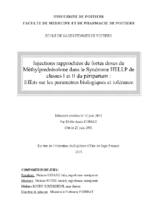Mémoire
Dumas Anais
Injections rapprochées de fortes doses de Méthylprednisolone dans le Syndrome HELLP de classes I et II du péripartum : effets sur les paramètres biologiques et tolérance
FrançaisConsulter le texte intégral (format PDF)

Résumé
Français
Injections rapprochées de fortes doses de Méthylprednisolone dans le Syndrome HELLP de classes I et II du péripartum : effets sur les paramètres biologiques et tolérance
Introduction : Le HELLP syndrome est une pathologie d’une particulière gravité mettant en jeu
le pronostic maternel et foetal. L’objectif principal de cette étude était d’évaluer l’effet de la
Méthylprednisolone à forte dose, sur l’évolution des paramètres cliniques et biologiques, ainsi
que sur la morbidité des patientes atteintes de syndrome HELLP de type I et II en antépartum
et post-partum.
Matériel et Méthode : Il s’agit d’une étude descriptive et rétrospective, portant sur l’évolution
des différents paramètres cliniques et biologiques du HELLP syndrome, traité par
Méthylprednisolone à forte dose dans le service de maternité du CHU de POITIERS de 2008 à
février 2015. Le HELLP syndrome ayant été diagnostiqué soit avant l’accouchement soit en
post-partum. Notre étude portait sur un effectif total de 14 patientes.
Résultats : On constatait une diminution significative du taux de LDH, d’ASAT, d’ALAT et
une augmentation significative du taux plaquettaire entre H0 et la fin de la corticothérapie.
Nous n’avons observé qu’un cas de transfusion plaquettaire. Une hyperglycémie au-dessus de
1,50g/L était retrouvée chez 64 % des patientes. Il n’y avait pas d’hypokaliémie et aucune
difficulté de cicatrisation. La diurèse avait tendance à être augmentée entre H24 et H48. La
durée d’hospitalisation moyenne était de 8,4 jours dont deux jours en moyenne en
USC/réanimation.
Conclusion : L’injection de Méthylprednisolone à très forte dose s’accompagne d’une
amélioration des paramètres biologiques du HELLP syndrome et d’une bonne tolérance.
Cependant, des essais cliniques multicentriques randomisés contrôlés versus placebo en double
aveugle sont nécessaires pour confirmer que cette amélioration est liée à la corticothérapie.
Mots-clés libres : HELLP syndrome, prééclampsie, corticostéroïdes, thrombopénie, cytolyse hépatique, hémolyse.
- Pré-éclampsie
- Méthylprednisolone
English
Introduction : HELLP syndrome is a disease of particular severity involving maternal and foetal
prognosis. The main objective of this study was to evaluate the effect of high dose
methylprednisolone on the evolution of clinical and biological parameters and the morbidity of
patients with HELLP syndrome type I and II during the antepartum and postpartum period.
Patients and Methods : This is a descriptive, retrospective study of the evolution of different
clinical and biological parameters of HELLP syndrome treated with high-dose
methylprednisolone in the maternity ward of the University Hospital of Poitiers from 2008 to
February 2015; HELLP syndrome was diagnosed either before birth or postpartum. The study
included a total of 14 patients.
Results: There was a significant decrease in LDH, AST, ALT, and a significant increase in the
platelet count between H0 and the end of corticosteroid therapy. A case of platelet transfusion
was observed. Hyperglycemia above 1.50 g / L was found in 64% of patients. There was no
hypokalemia and no difficulty in cicatrisation. Diuresis tended to be increased between H24
and H48. The mean hospital stay was 8.4 days including two days on average in USC /
resuscitation.
Conclusion: The injection of methylprednisolone at very high doses is associated with an
improvement in laboratory parameters of HELLP syndrome and in good tolerance limits.
However, randomized-controlled versus double-blind placebo-controlled multicentre clinical
trials are needed to confirm that this improvement is related to steroids.
Notice
- Diplôme :
- Diplôme état sage femme 5ème année
- Établissement de soutenance :
- Université de Poitiers
- UFR, institut ou école :
- UFR Médecine et Pharmacie
- Domaine de recherche :
- Maïeutique
- Directeur(s) du travail :
- Olivier Pourrat
- Date de soutenance :
- 10 juin 2015
- Président du jury :
- Julia Deparis
- Membres du jury :
- Olivier Pourrat, Annick Potier, Aurélie Boury-Goudeseune
Menu :
-
-
à propos d'UPétille
-
Voir aussi
Annexe :

-
Une question ?
Avec le service Ubib.fr, posez votre question par chat à un bibliothécaire dans la fenêtre ci-dessous ou par messagerie électronique 7j/7 - 24h/24h, une réponse vous sera adressée sous 48h.
Accédez au formulaire...
Université de Poitiers - 15, rue de l'Hôtel Dieu - 86034 POITIERS Cedex - France - Tél : (33) (0)5 49 45 30 00 - Fax : (33) (0)5 49 45 30 50
petille@support.univ-poitiers.fr -
Crédits et mentions légales
